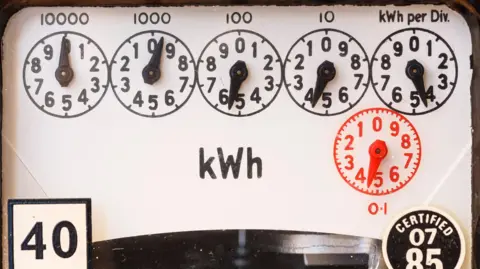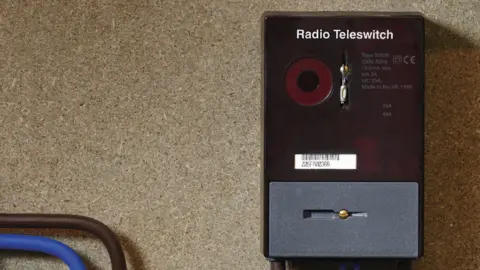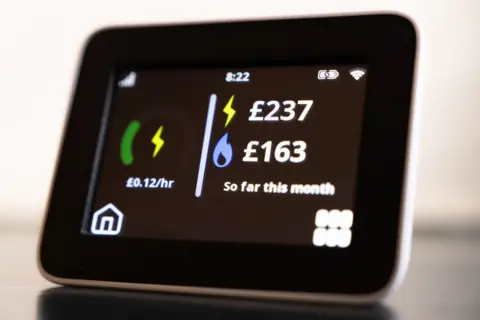Why Scotland could be hardest hit by RTS meter switch off
 Getty Images
Getty ImagesA worrying deadline is looming for nearly 135,000 Scottish homes that have old-style RTS electricity meters installed.
From 30 June, the radio signal that controls them will start to be switched off - with a risk customers could be left without heating and hot water.
Another scenario is that heating could start running all the time and customers could see their bills soar.
Energy suppliers are racing against the clock to replace the old equipment.
But meeting the deadline is a huge challenge, particularly in Scotland which accounts for a third of the total number of RTS meters in the UK still waiting to be upgraded.
What are RTS meters?
RTS stands for Radio Teleswitch Service - a system dating back to the 1980s that uses a radio signal to tell meters to switch between different electricity price rates.
It uses the longwave radio frequency, which is becoming obsolete, and the equipment that generates the signal is due to be switched off this summer.
Most households, including those with older meters, will be unaffected.
But homes that use electric storage heaters or pay different electricity rates at different times of the day are more likely to have RTS equipment fitted.
Why does Scotland have so many of them?
Figures obtained by BBC Scotland News suggest by the end of April there were about 432,000 RTS meters still to be replaced in the UK - with nearly 135,000 located in Scottish properties.
The reason for the disproportionate number in Scotland is partly due to geography.
With a large rural population in areas like the Highlands and Islands, many households are off the mains gas grid and therefore more likely to use electricity for hot water and heating.
 Getty Images
Getty ImagesUrban areas are also affected because Scottish energy suppliers were pro-active in encouraging use of storage heaters in the late 20th Century, promoting cheaper tariffs such as Economy 7 or Economy 10.
Storage heaters were also seen as a good option for replacing open fires in local authority or social housing. Many of these homes are now privately-owned.
About half of the meters waiting to be replaced are believed to be in the Highlands and Islands, but around 20,000 are thought to be in Glasgow.
Will RTS meters be replaced in time?
Energy suppliers have been writing to customers, urging them to make an appointment to get their RTS meters replaced with a smart meter.
But the rate of replacement appears to be way behind what is required to meet the 30 June deadline when the signal is switched off.
In September, there were about 175,000 RTS meters waiting to be replaced in Scotland and since then that figure has fallen by about 40,000 - a replacement rate of under 6,000 per month.
Meeting the 30 June deadline would require a 12-fold increase in the number of replacements being carried out.
The issue was debated at Westminster in early April when UK energy minister Miatta Fahnbulleh said the replacement rate was "not acceptable".
However, she said that suppliers were promising a "spring sprint" to try to meet the deadline in Scotland.
A number of customers have contacted BBC Scotland to report they have had difficulties arranging meter replacement appointments.
Scottish Power said 80% of its replacements had either been completed or scheduled but that 20% of affected customers did not yet have an appointment.
The firm pointed out that the signal switch-off was phased and would not end completely until September.
The UK government said it was demanding that suppliers increase the pace of replacements and that they ensure no-one loses heating or hot water.
The SNP has called for the 30 June switch-off date to be delayed, or for a guarantee of compensation if customers face increased costs.
Climate minister Alasdair Allan said the Scottish government was doing everything it could, "within our limited devolved powers" to mitigate the impact.
He said: "This is a reserved issue and we need suppliers, the UK government and Ofgem to demonstrate the leadership required to meet the scale of the challenge."
How do I know if I have an RTS meter?
Some - but not all - RTS systems have a separate box near the electricity meter with the words "radio teleswitch" or "radio telemeter".
If you pay a different tariff for electricity at different times of the day - and the switching occurs automatically - this is an indication you may be affected.
 Ofgem
OfgemElectricity tariffs named "Comfort Plus" and "Total Heat Total Control" are linked with RTS meters.
Homes with electric storage and water heaters are more likely to use the equipment.
If in doubt, the best advice is to contact your electricity supplier.
Suppliers should replace the old RTS meters free of charge.
But there might be charges if the meter needs to be moved or wiring replaced. Suppliers should inform customers if this is the case.
Customers are warned to be wary of people offering to replace meters for a fee, in case they are scammers.
Can smart meters solve the problem?
Smart meters can work in a similar way to the old-style meters by providing automated switching between peak and off-peak rates.
They should also be able to turn hot water systems off and on.
However, customers will have to move onto a new smart meter tariff which could involve changes such as different off-peak times.
 Getty Images
Getty ImagesOrkney MP Alistair Carmichael has reported complaints from constituents who say the cheapest tariff is no longer available to them after replacements, and that their bills have risen.
The regulator Ofgem is working with suppliers on how to fulfil a pledge that customers should be no worse off as a result of the switchover.
Another issue with smart meters is that they sometimes struggle to work in areas like the Highlands and Islands where there is poor network connectivity.
An alternative in such cases is to have a smart meter which is pre-programmed to switch to different rates at certain times of the day.
